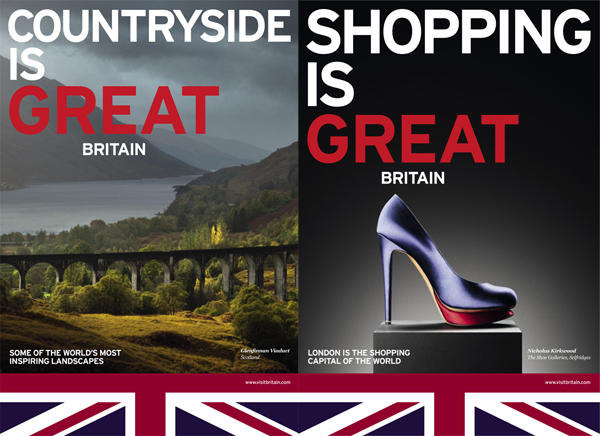Living in Great Britain, especially London at the moment is extra good. We had the Diamond Jubilee celebrations last month – a great party for all and a celebration of who we are and what we stand for. Olympic excitement is now starting to build around the UK with the nation proud to be hosting such a great event and being able to showcase who and what we are as a nation to the world.
As I am swept along with the excitement I read about the next £25m phase of the GREAT campaign promoting the British brand abroad.
As I still try in vain to get Olympics tickets I ask myself:
Does Great Britain need a branding campaign?
Why a country needs to think about branding
Every country needs to act like a company in order to boost commercial success. Tourism, export sales and investment both from home and abroad are critical to a country’s economy. Just like a consumer brand, a country competes daily with its competitors for every area of its business . Therefore a country’s reputation and perception are vital to drive business.
For example Silvio Berlusconi the ex Italian Prime Minister developed such a reputation abroad which must have contributed in no small part to his resignation and failure to secure an economic deal for Italy at regional summits .
Similarly Germany has managed to build a reputation of engineering excellence. Any product made in Germany e.g. a car is viewed as quality and reliable thus leading to increased success of German brands outside of the domestic marketplace.
Branding a country
I believe there are 4 basic steps based on basic marketing principles to branding a country:
1. Cooperation and involvement of all areas which have an influence on the brand: government, business, the arts, sport, education and the media.
It is vial that all parties are involved in and agree with a direction. The government is there to support but not act as a dictator. Positive examples of branding will also be supported by the media, who will help build the country brand reputation. For example the Royal Wedding was broadcast on the main terrestrial channels and subsequently watched by over 24m viewers in the UK alone.
2. Determine what people think about the country
Back to marketing basics – know your target consumer both at home and abroad. Clearly identify key target audiences e.g. tourists and investors. What do your target think are your strengths and weaknesses?
Consult with and use opinion leaders to look at national strengths and weaknesses.
A great example of this was back in 1997 and just three months after being elected, the UK Prime Minister Mr Blair invited Noel Gallagher of Oasis, Ralph Fiennes a leading British actor and Vivienne Westwood a British designer, to a celebration at Number 10.
It was a defining event that marked out Mr Blair and New Labour as part of a new ‘cool’ era sweeping through 1990s Britain.
Known as Cool Britannia it was a period of increased pride in the culture of Great Britain and a period of optimism amongst the British people.

3. Build a strategy – must include how the brand proposition will be communicated to the diverse audiences eg tourist and investors will have a different take on a message. Simple messaging is best.
4. Build a program to deliver the strategy through visible campaigns, improvement programs etc
Key to the success of any campaign but especially with a brand campaign for a country is integration hence my first point critical to success is:
Cooperation and involvement of all areas which have an influence on the brand.
The Great Campaign
Applying all of this to the current GREAT campaign.
What do people think about Great Britain ?
In the findings from the latest Anholt-GFK Roper Nation Brands Index (NBI)
Great Britain is now the third most admired destination globally:
- Appeal as a tourist destination – historic landmarks and vibrant city life
- Increased aspirational appeal
- Interesting and exciting place for contemporary culture – music, films, art, literature and sport
Build a strategy with simple messaging
Simple bold, exciting and creative.

Use of key influencers and opinion leaders to talk about GREAT Britain
This is Britain’s biggest ever tourism campaign costing over £125m .
Key objectives are: to attract 4.6 million more visitors, £2.3bn in additional visitor-spend, and £1bn of extra investment over the next four years.
Its simplicity and boldness and use of well known talent works for me, and to not leverage the attention on the nation from the Royal Wedding, Diamond Jubilee and Olympics would have been a huge wasted opportunity.
I await with excitement the next installment of the Great British branding exercise – the Olympics. If only I could get some tickets…